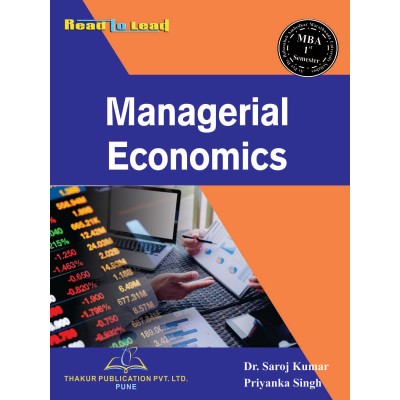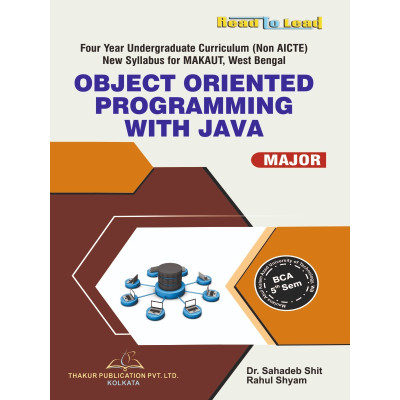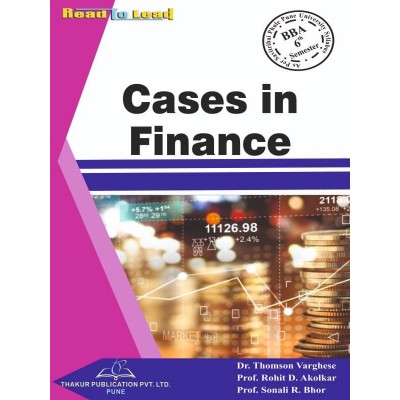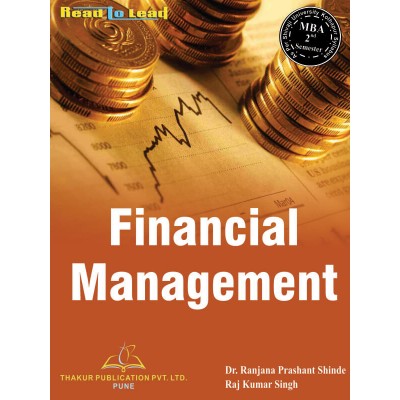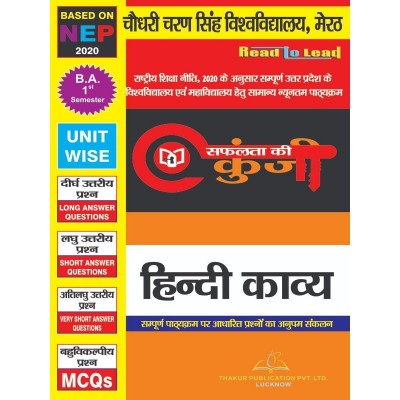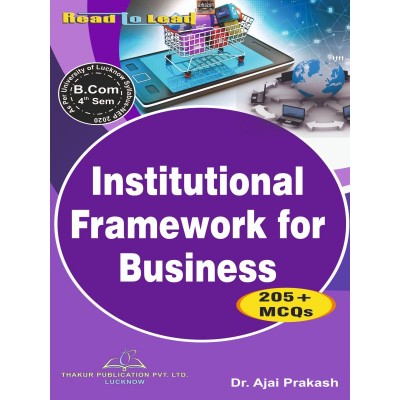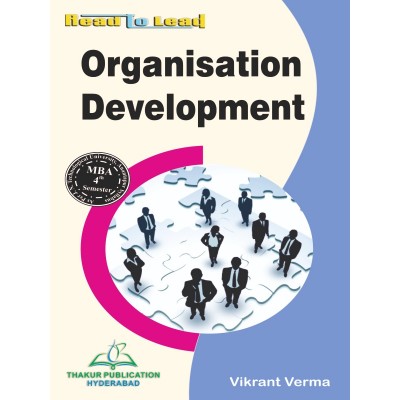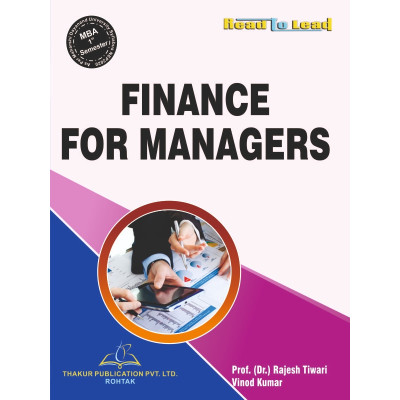Categories
- Pharmacy
-
Nursing
-
MBA
-
BBA
- U.P. State University
- Veer Bahadur Singh Purvanchal University, Jaunpur
- Chaudhary Charan Singh University, Meerut
- Dr. Bhimrao Ambedkar University, Agra
- Chhatrapati Shahu Ji Maharaj University, Kanpur
- Mahatma Jyotiba Phule Rohilkhand University, Bareilly
- Mahatma Gandhi Kashi Vidyapith, Varanasi
- Dr. Ram Manohar Lohia Avadh University, Ayodhya
- Deen Dayal Upadhyaya Gorakhpur University
- Prof. Rajendra Singh (Rajju Bhaiya) University, Prayagraj
-
BCA
- UP State Universities
- University of Pune
- I.K.Gujral Punjab Technical University (PTU)
- University of Rajasthan
- Rashtrasant Tukadoji Maharaj Nagpur University
- Uttar Pradesh NEP2020
- University of Rajasthan ,Jaipur (According to NEP-2020)
- BCCA (B. Com - Computer Science)
- Haryana
- West Bengal
- BBA (CA)
- PUNE BCA (Sci,Commerce)/B.Com (CA)
- Dr. A. P. J. Abdul Kalam Technical University, Lucknow ( AKTU )
- MCA
-
B Ed
- Lucknow University B.Ed Books
- Chaudhary Charan Singh University/Maa Shakambhari University, Saharanpur
- Dr Bhim Rao Ambedkar University, Agra
- Mahatma Gandhi Kashi Vidyapeeth, Varanasi
- Chhatrapati Shahu Ji Maharaj University
- Prof. Rajendra Singh (Rajju Bhaiya) University, Prayagraj (PRSU)
- Mahatma Jyotiba Phule Rohilkhand University(Mjpru), Bareilly
- Dr. Ram Manohar Lohia Avadh University, Ayodhya
- Bundelkhand University, Jhansi
- B.A,B.ed
- B.Sc, B.ed
- Deen Dayal Upadhyaya Gorakhpur University
- Veer Bahadur Purvanchal University (VBPU)
- Maharaja Suhel Dev State University ,Azamgarh (MSDSU)
- Raja Mahendra Pratap Singh State University, Aligarh (RMPSSU)
- Barkatullah Vishwavidyalaya (Bhopal)
- Jiwaji University (Gwalior)
- Vikram University (Ujjain)
- Dr. Harisingh Gour University (Sagar)
- Devi Ahilya Vishwavidyalaya (Indore)
- Rani Durgavati Vishwavidyalaya (Jabalpur)
- Awadhesh Pratap Singh University (Rewa)
- Maharaja Chhatrasal Bundelkhand University (Chhatarpur)
- D. EL. ED
- TET
-
B Com
-
B Sc
- B.Sc. U.P. State Universities Common Syllabus NEP
- Veer Bahadur Singh Purvanchal University, Jaunpur
- University of Lucknow
- Chaudhary Charan Singh University, Meerut
- Madhya Pradesh
- Chhatrapati Shahu Ji Maharaj University, Kanpur
- Dr. Bhimrao Ambedkar University, Agra
- Mahatma Gandhi Kashi Vidyapith, Varanasi
- DEEN DAYAL UPADHYAYA GORAKHPUR UNIVERSITY
- Prof. Rajendra Singh (Rajju Bhaiya) University, Prayagraj
- Dr. Ram Manohar Lohia Avadh University, Ayodhya
- Mahatma Jyotiba Phule Rohilkhand University, Bareilly
- Uttarakhand State Universities
- B.Sc. Bihar Universities Common Syllabus NEP
- University of Rajasthan (Jaipur)
- Haryana
-
Bachelor of Arts [B.A.]
- B.A. Of U.P. State Universities Common Syllabus NEP
- Veer Bahadur Singh Purvanchal University, Jaunpur
- University of Lucknow
- Chaudhary Charan Singh University, Meerut
- Chhatrapati Shahu Ji Maharaj University, Kanpur
- Dr. Bhimrao Ambedkar University, Agra
- Mahatma Gandhi Kashi Vidyapith, Varanasi
- Deen Dayal Upadhyaya Gorakhpur University
- Prof. Rajendra Singh (Rajju Bhaiya) University, Prayagraj
- Dr. Ram Manohar Lohia Avadh University, Ayodhya
- Mahatma Jyotiba Phule Rohilkhand University, Bareilly
- Madhya Pradesh
- Uttarakhand
- Bihar
- University of Rajasthan (Jaipur Syllabus as Per NEP2020)
- Haryana NEP-2020
- B Tech
- LLB
- SWA Education
Managerial Economics MDU MBA First Semester
Authers : Mrs. Priyanka Singh, Mr. Vipin singh
ISBN : 9789361800030

Authers : Mrs. Priyanka Singh, Mr. Vipin singh
ISBN : 9789361800030
Tax excluded
MANAGERIAL ECONOMICS
Course Code: 24IMSI201DS03
L-T-P External Marks: 70
3-1-0 Internal Marks: 30
Time: 3 Hours
Course Objectives
1. Apply economic principles to management decisions.
2. Understand the Nature, Scope and Significance of Managerial Economics, and its Relationship with
other Disciplines.
3. Understand the Role of Managerial Economics in Decision Making.
4. Understand the cardinal and ordinal approaches of consumer behavior.
Course Outcomes
After completing the course students would be able to:
1. Define the basic elements of managerial economic aspects of firm.
2. Forecast demand for a product.
3. Know what to produce, where to, when to, how to, for whom to produce.
4. Frame policy for production to minimize the cost and maximum the profit.
5. Construct the cost function.
UNIT-I
Nature and scope of managerial economics; nature of marginal analysis; alternative objectives of business firms;
cardinal utility theory; indifference curve technique and the theory of consumer choice; consumer surplus; price,
income and substitution effects; demand elasticity; demand estimation and forecasting; relationship between
price elasticity and marginal revenue.
UNIT-II
Law of variable proportions; laws of return; optimal input combination; output-cost relations; engineering cost
curves; technological change and production decisions; revenue curves of a firm; price-output decisions under
alternative market structures; shut-down points; Baumol’s sales maximization model; advertising and price
output decisions.
UNIT-III
Product differentiation; price-output decision in multi-plant and multi-product firms; general pricing strategies;
special pricing techniques – limit pricing, peak load pricing and transfer pricing; dumping analysis; pricing of
public utilities.
UNIT-IV
Risk analysis; investment and capital replacement decisions; locational choice of a firm; measures of national
income; business cycles; operative aspects of macroeconomic policies; inflation analysis; tariff analysis.
Recommended Readings:
1. Hirschey, Mark, Managerial Economics, Thomson Learning, Bangalore
2. V. Agarwal, Managerial Economics, Pearson Education.
3. Monroe, Kent B., Pricing-Making Profitable Decisions, McGraw-Hill, New York
4. Keat, Paul B., and Philip K.Y. Young, Managerial Economics – Economic Tools for Today’s Decision
Makers, Pearson Education
5. Salvatore, Dominick, Managerial Economics in a Global Economy, Thomson Learning, Hyderabad
Instructions for External Examiner: The question paper shall be divided in two sections. Section A shall
comprise of seven short answer type questions from whole of the syllabus carrying two marks each, which shall
be compulsory. Answer to each question should not exceed 50 words normally. Section B shall comprise 8
questions (2 questions from each unit). The students will be required to attempt four questions selecting one
question from each unit. All questions will carry equal marks.
16 other products in the same category:
Your review appreciation cannot be sent
Report comment
Report sent
Your report cannot be sent
Write your review
Review sent
Your review cannot be sent









